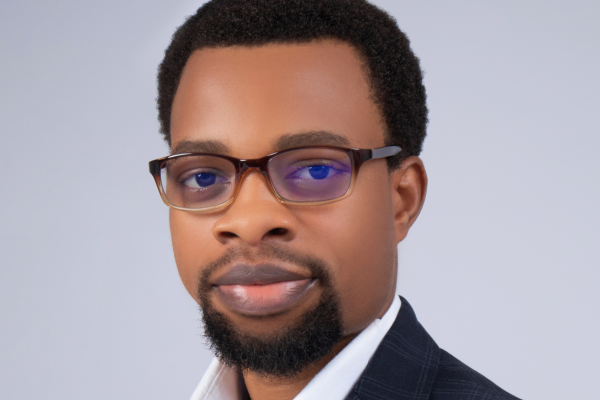From the international stage to U of T: Student researcher advances energy justice solutions


Emmanuel Taiwo’s experiences growing up in Lagos, Nigeria, sparked his deep interest in the intersection of social inequality and sustainability.
During his undergraduate degree in Lagos, Taiwo noticed how different educational and economic backgrounds shaped behaviours around sustainable practices, like food waste and energy conservation.
“Growing up, it was fascinating to me how people from various income levels lived side by side but experienced distinct inequalities,” says Taiwo, a doctoral researcher in the department of physical and environmental sciences at U of T Scarborough.
“The injustices and inequalities we see in society often result from policy failures, where the needs of underserved communities – whether energy, climate or the broader environment – are neglected.”
Taiwo’s interests in equitable climate, energy and environmental sustainability transitions led him to pursue a master’s in sustainable environmental management at the University of Greenwich and later, followed by another master’s in public policy at the University of Oxford.
With a decade of experience as a climate and environmental sustainability advisor, Taiwo, a chartered environmental professional, has held several advisory roles with international organizations, including the United Nations Environment Programme in Nairobi, Kenya. Most recently, Taiwo worked for the U.K. government’s department for international development as a climate and environment adviser.
He was lead adviser for the Solar Nigeria Programme, the U.K.’s £66-million-funded low-carbon development initiative that powered public health and education facilities in Nigeria with off-grid solar energy.
With a more than 200 million population, more than 55 per cent of people in Nigeria lack access to reliable electricity. The program provided energy access to almost one million people.
“While one million may seem like a small number compared to Nigeria’s population, it was pleasing to work on this rewarding project and help underserved communities access to clean energy,” Taiwo says.
At U of T Scarborough’s IMPACT Lab, Taiwo’s dissertation examines clean energy innovations — solutions that improve environmental, social, and economic outcomes —and access to energy retrofits in the Greater Toronto Area’s underserved neighbourhoods. He is supervised by Laura Tozer, an assistant professor in the department of physical and environmental sciences.
Energy retrofits are improvements made to buildings, like upgrades to HVAC systems or adding renewable energy sources, to make them energy efficient and lower energy bills. According to a 2021 report by the Canadian Urban Sustainability Practitioners, approximately 1.1 million households in Ontario experience energy poverty. While research in Canada is limited, in many cases, energy retrofit programs have not fully tapped their potential to tackle energy poverty, particularly factors that contribute to it.
Taiwo will partner with GTA-based non-profits focused on energy projects, taking a community-oriented equity approach. Taiwo will also aim to understand the challenges non-government actors face, such as limited capacity in supporting communities.
In a new paper published in Energy Research & Social Science, Taiwo and Tozer outline the concept of community energy justice, emphasizing the need for collaboration with community actors to foster equity and justice in energy transitions.
His goal is to empower actors at all levels to advocate for themselves.
“The lack of entry points into communities lies in the distrust,” Taiwo says. “My approach to research will foster collaborations with civic and non-governmental actors to engage communities where trust is already being established.”
“It’s going to be ethical and respectful, while upholding the dignity of these groups.”
It’s not the only project he’s working on. In collaboration with Sociology Professor Patricia Romero-Lankao, Taiwo is working on the “Canada Excellence Research Chair Network for Equity in Sustainability Transitions” a cross-border eight-year research program examining equitable sustainability transitions in Canada, the U.S., and Mexico. He is also a research fellow at the Schwartz Reisman Institute for Technology and Society, where he investigates the intersections between AI and equitable climate and energy transitions.
Taiwo is grateful for the opportunities that continue to inform his work since joining the university.
“I knew that I wanted to build on my research skills and deepen my expertise,” Taiwo says.
“The opportunities that I have received so far are indicators that I’m doing something right –and there is so much work to be done.”







